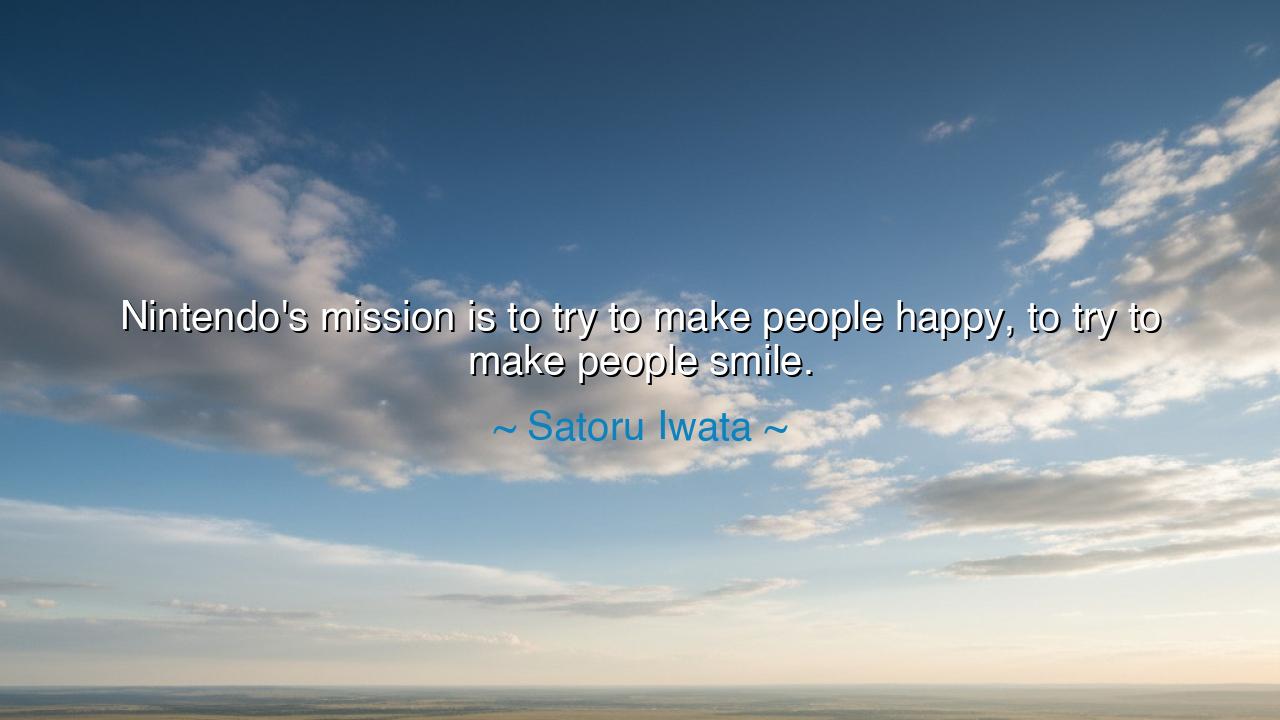
Nintendo's mission is to try to make people happy, to try to make






Hear the words of Satoru Iwata, a humble leader of vision and play, who declared: “Nintendo’s mission is to try to make people happy, to try to make people smile.” These words, though spoken in the language of business, ring with the cadence of timeless wisdom. For here is a man who did not see profit as the highest prize, nor conquest of markets as the greatest victory. Instead, he placed joy at the center of his work, as if to say: the true purpose of creation is not domination, but delight.
The origin of this teaching lies in the ancient recognition that joy sustains the human spirit. From the earliest storytellers who gathered tribes around the fire, to the wandering bards whose songs stirred laughter and tears, the highest art was always that which lifted the heart. Iwata, in his time, inherited this mantle through the medium of games. He understood that beyond pixels and machines, the true product of his labor was not a console, but a smile—a moment when burdens were set aside, and life was made brighter.
The ancients also knew this truth. In Greece, festivals in honor of Dionysus filled the people with theater, laughter, and dance, reminding them that life was not only toil, but celebration. In Rome, bread and circuses were offered to lighten the weight of existence. But unlike those fleeting distractions, Iwata sought something purer—not spectacle for control, but joy for its own sake. His mission was not to manipulate the masses, but to serve them, to give them a gift that united families, friends, and generations across the boundary of years.
History offers us the story of Walt Disney, another dreamer of joy. In the ashes of the Great Depression, when despair hung heavy, he gave the world Mickey Mouse and later Disneyland—places where even the weary could enter and feel the weight of sorrow lift. Like Iwata, Disney believed that the purpose of creation was not just invention, but enchantment. Their work teaches us that those who devote themselves to making others happy leave behind legacies that outlast gold or steel.
Iwata himself lived this creed not only in words, but in sacrifice. When his company faced hardship, he cut his own salary rather than cast aside workers. Why? Because he knew that to take joy from the world, one must first protect the joy of those who help to build it. This is the spirit of a true servant-leader: to place the smile of others above the comfort of oneself. Such actions reveal that his quote was not mere philosophy, but the very compass of his life.
The meaning is profound: our highest mission is not to climb above others, but to lift them up. To bring even one smile into the world is to leave it brighter than before. And if we dedicate ourselves, as Iwata did, to multiplying those moments of joy, then our lives ripple outward like rings in water, touching countless souls we may never meet. This is the true mark of greatness—not power seized, but happiness shared.
Therefore, beloved, let this be your practice: ask yourself not only how much you can achieve, but how much joy you can bring. Seek the smile in your work, in your home, in your encounters with strangers. Remember that to make another happy is no small act; it is the highest service, the noblest calling. For as Iwata has shown, when our mission is joy, our legacy is light. And when our days are done, it will be said of us, as it was of him: this one lived to make people smile.






AAdministratorAdministrator
Welcome, honored guests. Please leave a comment, we will respond soon